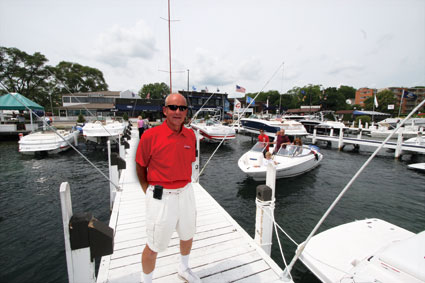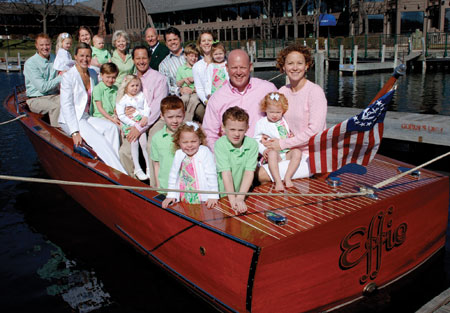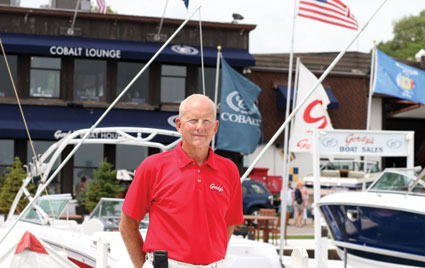The Classical Entrepreneurial Attitudeby Steve Charles |
| Printer-friendly version | Email this article |
|
“The day after I got elected I went into the village administrator’s office. He had a sign on his desk that said, ‘What part of “no” don’t you understand?’” You might say it rubbed the new president the wrong way. “I grabbed it off his desk and I ripped it into pieces and threw it into the wastebasket,” the former Wabash English major re-calls. “I said, ‘From now on, here’s how it’s going to be: I don’t care how cockamamie or ridiculous an idea you may think someone has, when they come in here, you’re going to say, ‘Well, that’s a novel approach,’ or ‘That’s an interesting idea—I’ve never heard that one before.’ We’re going to start being nice to people, we’re going to start answering the phones and doing things service organizations do.’” Whowell shakes his head as if he could grab that sign from his own memory and fling it into the lake his business depends on. It’s the antithesis of his approach to government, to business, to working with his family to bring forward a legacy, to life in general. Tom Whowell understands what no means; that’s why he won’t accept it as an answer. ON A WARM, SUNNY FRIDAY morning in July he pulls up in front of Gordy’s Lake-front Marine—the business his father, Gordy Whowell, founded with him, his mother, and brother 55 years ago on the shores of Wisconsin’s Geneva Lake. He’s driving a Wabash-red Hummer and his German shepherd, Apollo, is sitting in the backseat with his head out the window, facing regally forward. Tom steps out to greet me. Tall, trim, and fit in white shorts, a red polo shirt, and sunglasses, he looks like a PE teacher I had in grade school. He moves with the same purposeful stride. All he needs is the whistle. But Whowell (pronounced like the owl character in Winnie the Pooh) is gregarious, welcoming with a warm handshake. At 72, he’s supposedly retired, but I’m told he’s here seven days a week, clearly a man who loves coming to the shop. “One of my goals for my education was to learn how not to work.” He laughs. “So far, I’ve never had to work a day in my life. I did do almost four years in the Navy, a couple of years in grad school, figured out a way to waste my 20s, then I came back here and hired people to do what I had been doing before. Our motto has always been ‘exceptional customer service,’ and that’s what we try to offer in every aspect of what we do, whether it’s boat rentals, service, or the restaurant. Our goal is to make everybody as happy as we can.” A fleet of testimonials from satisfied customers and awards from boat manufacturers and civic groups—Gordy’s was the world’s largest Cobalt Boat dealer in 2009 and the Wisconsin Family Business of the Year in 2010—suggests Whowell is meeting that goal. He asks how much time I have and what I need for the photo shoot I’m here to do. He listens to my rambling explanation, thinking how best to accomplish all this. He does nix one idea I have. “People look goofy standing in boats, pretending they’re driving,” he says. So I ask him to show me around to find a place. The warm air smells of water, French fries, and fuel—evoking my own memories of carefree vacations on the water—as we walk the docks, then duck into The Bait Shop (the waterside snack shop), then past a sleek fiberglass Cobalt cruiser that sells for six figures. Gordy’s is the epitome of a family business—Tom and his wife, Geri, and their co-owners, their children and their and spouses, gather every Sunday for dinner together—but it’s no mom-and-pop marina. From modest beginnings in 1955, Gordy’s Lakefront Marine today comprises the marina, Cobalt Boat sales space, boat storage, a 30-acre world-class Cobalt Boat service center, boat rental, a waterski and wakeboard school, a pro shop and sportswear store, the Boat House Bar and Restaurant, and the Cobalt Lounge. In essence, Gordy’s is the commercial lakefront of the town. Yet it somehow feels friendly, intimate. Grade-school kids come and go unescorted from the snack shop, folks talk to one another in the middle of the street, the restaurant is a cacophony of conversation and laughter. We snap a few photos and Whowell tells me how it all got started—with a 1948 Chris Craft named Effie. “My father was in the automobile business—he had the classic entrepreneurial attitude. He’d be driving down the road and see a car he liked and, even if it didn’t have a ‘For Sale’ sign on it, he’d stop and ask if they wanted to sell it. “There was a pier here where my Uncle Jerry had this speedboat business, and Gordy managed to work his way in. In 1955 Uncle Jerry wanted out, and Gordy bought the entire business.” And brought that classic entrepreneurial attitude with him. “We gave speedboat rides, then we’d add one component at a time. We were the first in the U.S. to rent big boats, back when everyone else rented 14-foot aluminum boats with little outboards on ’em. Gordy said, ‘Why don’t we rent those big 18-footers,’ and that thing just took off. We had people lined up waiting to get in, on Saturdays and Sundays, for 10 years. That was the business that really got us going.” Rentals are still an active part of Gordy’s business, though it’s a little slow today, as Whowell is quick to notice. “That’s the rental dock there,” he says, pointing, “where all those guys are sitting on the pier busily wasting my money.” The elder Whowell died in 1988, “but Gordy’s name is still on most of what we do,” Whowell says. “We’re also famous for our flags, and our gardens. We do a lot with flowers to make this urban area, which is mostly concrete, feel a little friendlier. That’s the kind of thing you learn from zoos, from cities—soften up the texture.” Even the young employees working the various venues are attractive—fit and wholesome employees who look as though they could work at Disney World.  WE TAKE A SEAT AT THE BAR in the Boat House Restaurant (Whowell drinks a soda) and I ask about the entrance to the town from the highway. It’s lined with brick sidewalks and classic black streetlamps, an inviting gateway that surprises you as you come over the hill in the middle of the Wisconsin countryside. WE TAKE A SEAT AT THE BAR in the Boat House Restaurant (Whowell drinks a soda) and I ask about the entrance to the town from the highway. It’s lined with brick sidewalks and classic black streetlamps, an inviting gateway that surprises you as you come over the hill in the middle of the Wisconsin countryside. I ask if Gordy’s had anything to do with that and find out that Whowell was village board president for six years (I’ll find out from other sources he did thatwork without pay). Not coincidentally, these years transformed not only the entrance of the town, but also the beachfront area, the state highway, park system, and administrative offices. Whowell also donated 30 acres to the Geneva Lake Conservancy and is raising 15,000 trees on about 90 acres to enhance Fontana’s recognition as a Tree City. He recalls the incident that spurred his running for public office, when members of the previous administration “came down here one day and wanted to rip out some of my evergreens. “They said the bushes were blocking traffic, but they weren’t, and it was a one-way street. That was the last straw—their attitude was embarrassing to me as a lifetime resident of this community.” So Whowell ran for president and won handily. But he was more serious about improving the town than even his more ardent supporters might have expected. “I replaced almost everyone in the administration, and I replaced them with people who had formal education, business acumen, people skills, and who wanted to actually talk to and serve people.” He changed the style of village meetings to make them more welcoming. “I almost never sat in the president’s chair. At the beginning of the meeting, I walked around the room and talked to the audience, and I could tell how much more comfortable people were when speaking. When I was up there on the throne, people’s voices cracked. But when I was in the audience, up close, they could relax and really tell me why they’re here. I wanted to get the most out of grassroots government. I wanted to hear their question.” And Whowell never voted. “I told them the first night, ‘I’m not going to vote.’ They said, ‘What if it’s a tie?’ ‘If it’s a tie’ I said, ‘we’re going to work it out.’ We spent many nights exchanging ideas, compromising. “All I tried to do when I was there was build consensus.” He built much more: a tax incremental financing district that is still paying for rebuilding infrastructure; a new beach house; a sewage lift station (completely underground); and major improvements to the highway, accomplished through an unusual “partnership.” “The state was going to resurface the highway, and the Village asked, ‘How about sidewalks, streetlights, and intersections?’ They said, ‘That’s up to you, but if you’re going to do all that, we’ll give you that part of the highway.’ So we added $3.5 million to the kitty, got our crews and state crews to put in the curbs and gutters, the landscaping, the irrigation system. These street lights are so cool at night. We dampened the traffic naturally. Our goal was to keep the village looking like a village, and we accomplished that.” On Whowell’s watch, the village also reclaimed an old landfill area and built soccer fields, a dog walking trail, and an oak savanna. Whowell had taken his father’s classic entrepreneurial attitude and applied it to village government and the place he loves. Whowell left the board in 2007 but still visits Village Hall once a week. He claims to be retired from both government and the business.  “Being semi-retired, and with my kids running the business, I’m essentially watching my estate being administered while I’m still alive,” he says. “Being semi-retired, and with my kids running the business, I’m essentially watching my estate being administered while I’m still alive,” he says.“Watching” seems too passive a word for Tom Whowell. His entire family not only meets for dinner each Sunday, but, at his insistence, has a professional family counselor to help work through any business or personal problems. Whowell takes understandable pride in his family’s accomplishments and seems optimistic for his children’s future. But he takes none of it for granted. AS I GET READY TO LEAVE, he asks one of his staff to show me a map and directions to my next stop, and then he walks me to the car, reminding me to look at the sidewalks, lights, and other amenities on the drive out. “It’s like an oasis here,” he says as we shake hands goodbye. “All of the sudden you come down this hill and into a different world.” I get back in my car and roll down the windows, and I hear Whowell talking to the teenaged parking lot attendant, a village employee. As I ease out of the lot the young man suddenly calls out and reminds me of the way back to the highway, pointing the right direction. I nod and thank him. “No problem—drive carefully, sir,” he calls with an enthusiasm I don’t recall from when I’d pulled in an hour earlier. In the rearview mirror I catch a glimpse of Tom Whowell striding purposefully back to Gordy’s. Read more about the Whowells at www.gordysboats.com Lower Photo: Geri and Tom Whowell (standing at back) gather with their children (now partners in the family business) and grandchildren in Effie, the 1948 Chris Craft that started it all back in 1955.
|

 TOM WHOWELL ’62 TELLS this story from his days as president of the Village Board of his hometown of Fontana, WI.
TOM WHOWELL ’62 TELLS this story from his days as president of the Village Board of his hometown of Fontana, WI.